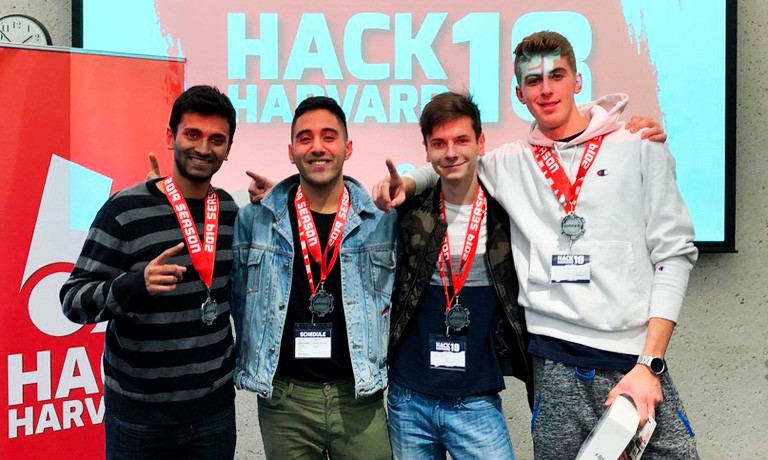First-year Concordia software engineering students win big at the Harvard University hackathon

Before they’d even taken one midterm, first-year Concordia software engineering students Nicolas MacBeth and Alex Shevchenko took a bus to Cambridge, Mass., to participate in HackHarvard, the Ivy League institution’s annual hackathon.
The trip was worth it. Joining forces with McGill University students Jay Abi-Saad and Ajay Patel, MacBeth and Shevchenko brought home first prize, in their first hackathon, in their first year in university.
The 36-hour event, which took place back in October, was attended by nearly 700 people from around the world. Registrants form teams and work to build an app from concept to working prototype.
We wanted to make an easy-to-use and affordable tool
The team went to work brainstorming as soon as the buzzer sounded. With the recent legalization of cannabis top of mind, the four Canadians found themselves inspired to work on a solution that would accurately identify a person driving under the influence. That night in Harvard’s hallowed halls, sober.AI was born.
“Sobriety behind the wheel has been and continues to be a very real issue, with serious security, legal and health implications,” explains MacBeth. “With only one third of law enforcement trained to ascertain sobriety, we wanted to see what we could do to make a tool that is both easy to use and affordable.”
The team set out to design and code their app knowing that, while it would address a serious social problem, it would also be technically difficult to build.
“We started with the parameters of the existing test that law enforcement uses to observe the behaviour of a driver and looked for ways to use artificial intelligence (AI) to replicate these observations,” Shevchenko explains.
Currently, trained law enforcement officers use a standard field sobriety test to make observations of drivers. The sober.AI app harnesses the power of AI in the form of computer vision, with the use of two different neural networks, to replicate the officers’ observations.
The test invigilators take a photo of subjects’ eyes, a video of them standing on one leg and then closing their eyes, and a second video of them attempting to touch their nose with their eyes closed.
The app then grades the subjects’ level of certainty of sobriety: a 90 to 100 per cent rating determines they are inebriated, and a 0 to 20 per cent rating determines they are sober.
Faster and more accurate results
The sober.AI team got their fellow participants involved in the app’s development, taking photos and video of them, as well as pulling from sources online, to create more than 800 data sources. Over time, with more extensive machine learning from more data sources, they expect accuracy to improve.
“Our goal was to create a sobriety test as accurate as the one law enforcement uses in the field but that both produces results faster and more accurately and that could be conducted by anyone,” says MacBeth.
The team believes that sober.AI has the potential to have a huge societal impact and contribute to saving lives. It could be used by friends trying to convince their peers not to drive inebriated. It could be used by law enforcement to reduce bias and cost, while increasing efficiency and accuracy. It could be used by employers seeking to test sobriety in a non-invasive way.
In the end, the app was recognized as one of three Best Overall Hacks at HackHarvard.
To get there, the team had to demonstrate their project, along with the other 103 entries, and hope they stood out to the judges. After being named finalists, they had only three minutes to present their winning submission. In addition to their first prize, the team also came away with a valuable learning experience:
“We were challenged to work as a team, manage the development of our app and create a presentation that would persuade the judges,” says Shevchenko.
“But most of all we were challenged to use different technologies with which we were not familiar.”
Learn more about sober.AI.
Find out more about Concordia's Department of Computer Science and Software Engineering at the Gina Cody School of Engineering and Computer Science.


